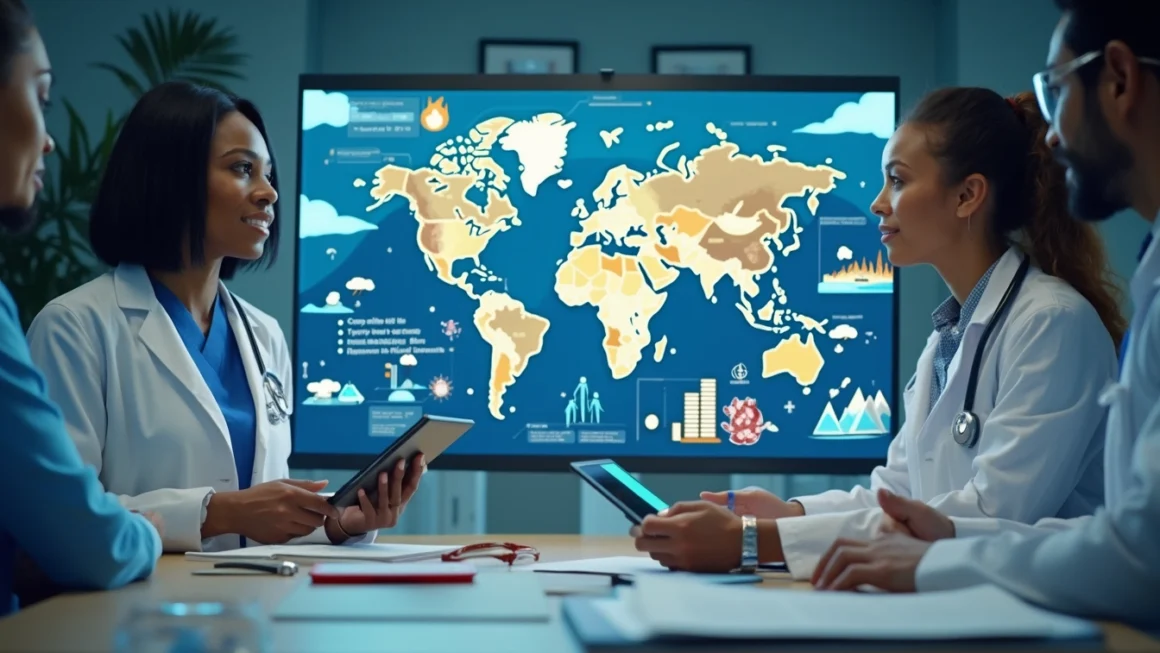Climate change is not just an environmental issue – it’s a pressing health concern that affects us all. As global temperatures rise and extreme weather events become more frequent, the impacts on human health are becoming increasingly evident. Healthcare professionals are at the forefront of addressing these challenges and advocating for climate action to protect public health.
The Health Impacts of Climate Change
Table of Contents
Climate change poses numerous threats to human health and wellbeing:
- Increased spread of infectious diseases as temperatures rise
- More frequent and severe heat waves leading to heat-related illnesses
- Respiratory issues from worsening air pollution and wildfires
- Food and water insecurity due to changing weather patterns
- Mental health impacts from climate anxiety and eco-grief
- Injuries and deaths from extreme weather events like floods and storms
These health risks disproportionately affect vulnerable populations, including children, the elderly, those with pre-existing conditions, and low-income communities. As climate change accelerates, the strain on healthcare systems is expected to grow significantly.
The Role of Healthcare Professionals
Healthcare providers play a crucial role in addressing the health impacts of climate change:
Treating Climate-Related Illnesses
Doctors and nurses are seeing more patients with conditions linked to climate change, from heat exhaustion to respiratory issues from wildfire smoke. They must stay informed about these emerging health threats to provide appropriate care.
Educating Patients and the Public
Healthcare professionals can raise awareness about the health risks of climate change and provide guidance on protecting oneself during extreme weather events or poor air quality days.
Advocating for Climate Action
Many healthcare organizations are taking a stand on climate change, advocating for policies to reduce emissions and prepare health systems for climate impacts. Their voices carry significant weight in policy discussions.
Reducing Healthcare’s Carbon Footprint
The healthcare sector itself is a major contributor to greenhouse gas emissions. Hospitals and clinics can take steps to become more sustainable, from improving energy efficiency to reducing medical waste.
Climate-Smart Healthcare
The concept of “climate-smart healthcare” is gaining traction, emphasizing the need to:
- Strengthen health systems to be more resilient to climate shocks
- Develop early warning systems for climate-related health threats
- Integrate climate considerations into medical education and training
- Invest in research on climate and health connections
- Promote sustainable healthcare practices that reduce emissions
Implementing climate-smart healthcare requires collaboration across sectors and a commitment to long-term planning and investment.
Taking Action: What Can Be Done?
Addressing the health impacts of climate change requires action at all levels:
Individual Level
- Stay informed about local climate risks and health advisories
- Reduce personal carbon footprint through sustainable lifestyle choices
- Prepare for extreme weather events and have emergency plans in place
- Support climate-friendly policies and candidates
Community Level
- Develop community resilience plans for climate-related health emergencies
- Create green spaces and urban cooling initiatives
- Support local food systems to enhance food security
- Implement clean energy projects to reduce air pollution
Healthcare System Level
- Conduct climate vulnerability assessments for healthcare facilities
- Invest in sustainable healthcare infrastructure and practices
- Integrate climate health into medical curricula and continuing education
- Collaborate with climate scientists and public health experts
Policy Level
- Implement strong emissions reduction targets and clean energy policies
- Develop national climate and health adaptation strategies
- Increase funding for climate and health research
- Ensure climate action plans prioritize health co-benefits
By taking a comprehensive approach to climate and health, we can work towards a more resilient and sustainable future. Healthcare professionals have a unique opportunity to lead by example and drive meaningful change.
The Path Forward
As the climate crisis intensifies, the intersection of climate and health will only become more critical. Healthcare professionals must be prepared to adapt to new challenges and advocate for systemic changes that protect both human and planetary health.
By embracing climate-smart healthcare practices and pushing for bold climate action, the healthcare sector can play a pivotal role in building a healthier, more sustainable world. This requires ongoing collaboration, innovation, and a commitment to putting health at the center of climate discussions.
As we navigate these complex challenges, it’s clear that addressing climate change is not just an environmental imperative – it’s a fundamental health priority. By working together across sectors and leveraging the expertise of healthcare professionals, we can create a more resilient healthcare system and a healthier future for all.
For those interested in exploring how technology can support climate action and healthcare initiatives, automation tools can play a crucial role in streamlining processes and enhancing efficiency in various sectors, including healthcare and environmental monitoring.




